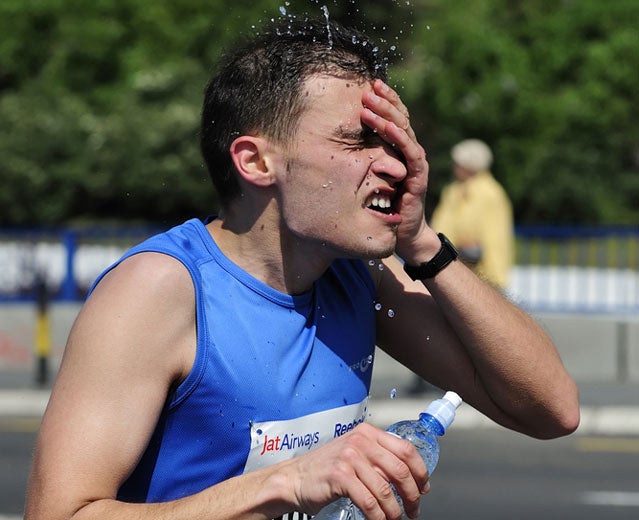Your odds for getting it again are indeed higher, but they don’t have to be.
Exertional heatstroke occurs when the body is unable to cool itself properly during exercise. Your core temperature rises above 104 degrees and the central nervous system goes on the fritz, causing symptoms including irrational behavior, dizziness, irritability, and, as you experienced, collapse. Exertional heatstroke often occurs during the hot, summer months, but it can happen anytime. And if your body isn’t cooled within about 30 minutes, you risk permanent complications and even death.
The thing is, if you are cooled quickly, it’s possible to recover fully from exertional heatstroke. You may have damaged functions that allow your body to thermoregulate, causing heat intolerance. However, heat intolerance experienced after a case of exertional heatstroke often goes away within a few months. “Most of it resolves over time,” says Douglas Casa, chief operating officer of the , a non-profit dedicated to preventing sudden death in sport. (Opened in 2010, the organization bears the name of an NFL player who died in August 2001 from exertional heatstroke suffered during a pre-season training camp.)
The biggest reason you’re at higher risk, Casa says, is whatever caused your heatstroke the first time is likely still an issue. Maybe you weren’t properly trained for the effort you did. Maybe you were poorly acclimatized to the heat, were sleep deprived, or dehydrated. (Here’s a complete list of things that can .) Avoiding any training or race day errors you might’ve made will help to keep you from passing out again and risking your life for sport.
And don’t be tempted to start back up at the same volume and intensity of training before you took time off—for heatstroke or otherwise. Casa pointed out in a study recently published in that athletes on sports teams who get behind while they’re out want to work harder to catch back up to the fitness and skill levels of their teammates. Working harder to make up for lost time could set you up for another disaster.
As for the possibility that you’re genetically predisposed toward exertional heatstroke, researchers are still looking into it. “There’s nothing conclusive on that matter,” Casa says. “But I think it’s very possible.”
THE BOTTOM LINE: Whatever caused your exertional heatstroke in the first place may still be an issue for you—from insufficient training to dehydration to sleep deprivation. Take control of the things you can change, and you’ll likely reduce your chances of getting it again.


